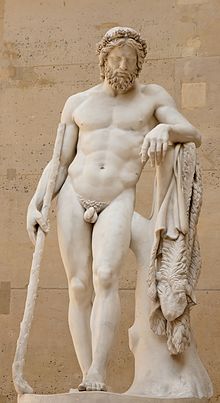| Aristaeus | |
|---|---|
 Aristaeus by François Joseph Bosio (1768–1845), (Musée du Louvre) | |
| Abode | Libya |
| Genealogy | |
| Parents | Apollo and Cyrene |
| Consort | Autonoë |
| Children | Actaeon and Macris |
Aristaeus (/ærɪˈstiːəs/; Greek: Ἀρισταῖος Aristaios) was the mythological culture hero credited with the discovery of many rural useful arts and handicrafts, including bee-keeping;[1] he was the son of the huntress Cyrene and Apollo.
Aristaeus ("the best") was a cult title in many places: Boeotia, Arcadia, Ceos, Sicily, Sardinia, Thessaly, and Macedonia; consequently a set of "travels" was imposed, connecting his epiphanies in order to account for these widespread manifestations.
If Aristaeus was a minor figure at Athens, he was more prominent in Boeotia, where he was "the pastoral Apollo",[2] and was linked to the founding myth of Thebes by marriage with Autonoë, daughter of Cadmus, the founder.[3] Aristaeus may appear as a winged youth in painted Boeotian pottery,[4] similar to representations of the Boreads, spirits of the North Wind. Besides Actaeon and Macris, he also was said to have fathered Charmus and Callicarpus in Sardinia.[5]
- ^ His inventions of apicultural apparatus, such as the linen gauze bee-keeper's mask and the technique of smoking the hive, were elaborated by Nonnus in his Dionysiaca, V.214ff.
- ^ An expression credited to Hesiod in Servius' commentary on Virgil's Georgics, I.14; cf. William J. Slater, Lexicon to Pindar (Berlin: de Gruyter) 1969, s.v. ""Nomios". When "pastoral Apollo" appears in lines of Theocritus (Idyll XXV) and Callimachus (Ode to Apollo, 47) the expression blurs the effective domaines of the two figures.
- ^ Hesiod, Theogony 977.
- ^ As on a Boeotian tripod-kothon at the Metropolitan Museum of Art, illustrated and discussed in Brian F. Cook, "Aristaios" The Metropolitan Museum of Art Bulletin New Series, 21.1 (Summer 1962), pp. 31-36; there Aristaeus hastens with a mattock and a one-handled amphora, which Cook interprets as filled with seed-corn.
- ^ Diodorus Siculus. Bibliotheca Historica, Book 4.82.4